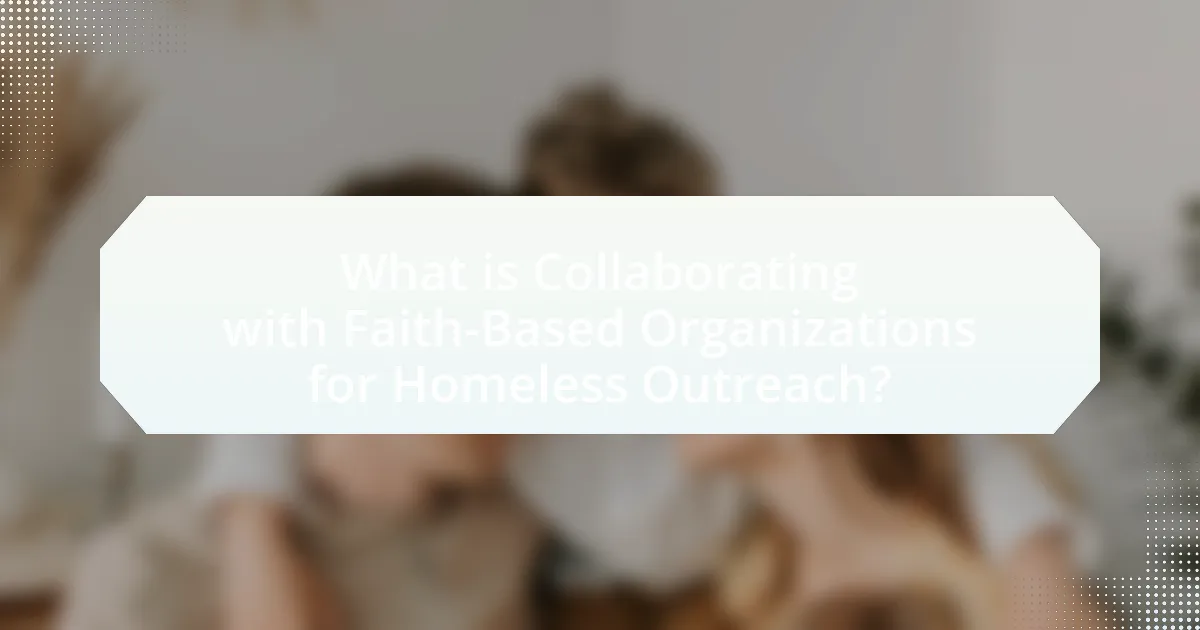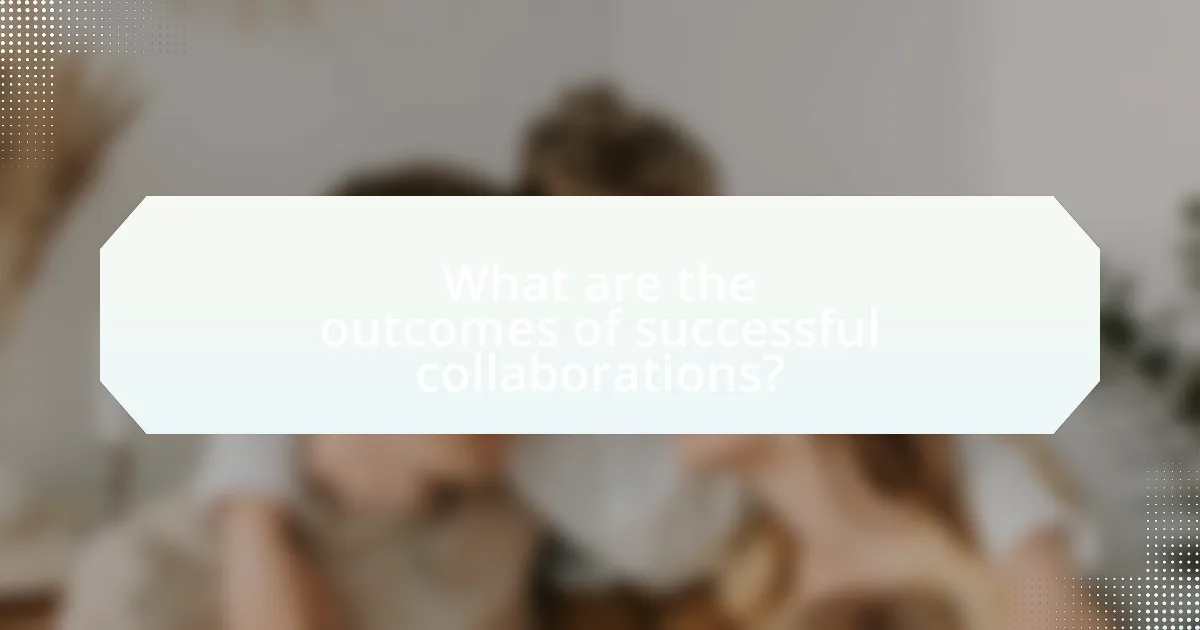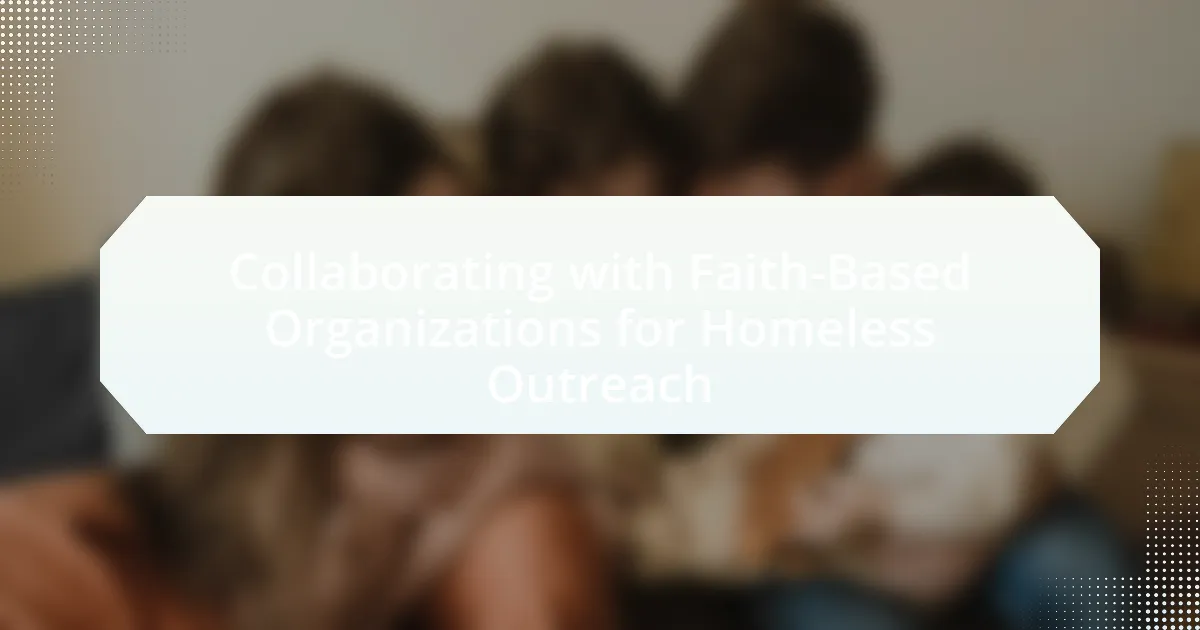Collaborating with Faith-Based Organizations for Homeless Outreach involves partnerships between governmental or non-profit entities and religious organizations to provide essential services to homeless individuals. The article outlines how these collaborations leverage community resources, volunteer networks, and advocacy efforts to enhance outreach initiatives, including food, shelter, and counseling services. It discusses the specific roles faith-based organizations play in the community, the advantages of collaboration, and the challenges faced in these partnerships. Additionally, it highlights best practices for effective collaboration, the impact of successful partnerships on the homeless population, and practical tips for enhancing cooperation with faith-based organizations.

What is Collaborating with Faith-Based Organizations for Homeless Outreach?
Collaborating with Faith-Based Organizations for Homeless Outreach involves partnerships between governmental or non-profit entities and religious organizations to provide services and support to homeless individuals. These collaborations leverage the resources, community connections, and volunteer networks of faith-based organizations, which often have a long-standing presence in local communities. For example, a study by the U.S. Interagency Council on Homelessness highlights that faith-based organizations play a crucial role in outreach efforts, providing food, shelter, and counseling services, thereby enhancing the effectiveness of homeless outreach initiatives.
How do faith-based organizations contribute to homeless outreach efforts?
Faith-based organizations contribute to homeless outreach efforts by providing essential services such as food, shelter, and counseling. These organizations often mobilize community resources and volunteers to address immediate needs, facilitating access to basic necessities for homeless individuals. For instance, a study by the National Alliance to End Homelessness highlights that faith-based groups are instrumental in operating emergency shelters and transitional housing programs, which serve thousands of homeless people annually. Additionally, these organizations frequently advocate for policy changes and collaborate with local governments to enhance support systems for the homeless population, demonstrating their significant role in both direct assistance and systemic change.
What specific roles do these organizations play in the community?
Faith-based organizations play crucial roles in the community by providing essential services, support, and advocacy for homeless individuals. These organizations often serve as shelters, offering food, clothing, and temporary housing, which directly address the immediate needs of the homeless population. Additionally, they facilitate access to healthcare, mental health services, and job training programs, helping individuals regain stability and independence. Research indicates that faith-based organizations contribute significantly to community cohesion and social support networks, enhancing the overall well-being of vulnerable populations. For instance, a study by the Urban Institute found that faith-based initiatives are instrumental in reducing homelessness by fostering partnerships with local governments and other nonprofits, thereby amplifying their impact.
How do faith-based organizations mobilize resources for homeless outreach?
Faith-based organizations mobilize resources for homeless outreach primarily through community engagement, fundraising, and partnerships. These organizations often leverage their existing networks to gather donations, both monetary and in-kind, such as food, clothing, and shelter. For instance, a study by the National Alliance to End Homelessness indicates that faith-based groups contribute significantly to local food banks and shelters, providing essential services to the homeless population. Additionally, they frequently collaborate with local governments and other nonprofits to enhance their outreach efforts, thereby maximizing their impact and resource availability.
Why is collaboration important in addressing homelessness?
Collaboration is important in addressing homelessness because it leverages diverse resources, expertise, and networks to create comprehensive solutions. By uniting various stakeholders, including government agencies, non-profits, and faith-based organizations, the collective effort can address the multifaceted nature of homelessness more effectively. For instance, a study by the National Alliance to End Homelessness highlights that communities employing collaborative approaches see a 30% reduction in homelessness rates compared to those that do not. This demonstrates that collaboration not only enhances resource allocation but also fosters innovative strategies tailored to local needs, ultimately leading to more sustainable outcomes for individuals experiencing homelessness.
What are the advantages of partnering with faith-based organizations?
Partnering with faith-based organizations offers significant advantages for homeless outreach initiatives. These organizations often have established trust within their communities, enabling them to effectively reach and engage homeless individuals. For instance, a study by the Urban Institute found that faith-based organizations are frequently viewed as credible and reliable sources of support, which enhances outreach efforts. Additionally, they typically possess extensive networks and resources, allowing for more comprehensive service delivery, including food, shelter, and counseling. This collaborative approach can lead to improved outcomes for homeless individuals, as evidenced by programs that have successfully reduced homelessness rates through such partnerships.
How does collaboration enhance the effectiveness of outreach programs?
Collaboration enhances the effectiveness of outreach programs by pooling resources, expertise, and networks from multiple organizations, which leads to a more comprehensive approach to addressing community needs. For instance, when faith-based organizations partner with local governments and non-profits, they can leverage their unique strengths—such as trust within the community, volunteer mobilization, and access to vulnerable populations. This synergy results in increased outreach capacity, improved service delivery, and better outcomes for individuals experiencing homelessness. Research indicates that collaborative efforts can lead to a 30% increase in service utilization among target populations, demonstrating the tangible benefits of working together in outreach initiatives.
What challenges exist in collaborating with faith-based organizations?
Collaborating with faith-based organizations presents challenges such as differing priorities, communication barriers, and varying levels of organizational capacity. These organizations may prioritize spiritual missions over social services, leading to potential conflicts in objectives. Communication barriers can arise from differing terminologies and cultural contexts, which may hinder effective collaboration. Additionally, faith-based organizations often vary in their operational capacity, resources, and experience in addressing homelessness, which can complicate partnership dynamics. These challenges are documented in studies highlighting the complexities of inter-organizational collaboration in social services, such as the research conducted by the Urban Institute, which emphasizes the need for alignment in goals and clear communication strategies to overcome these obstacles.
What are common barriers to effective collaboration?
Common barriers to effective collaboration include communication issues, differing organizational goals, and lack of trust among partners. Communication issues arise when stakeholders do not share information effectively, leading to misunderstandings and misalignment. Differing organizational goals can create conflicts, as each entity may prioritize its own objectives over collective aims. Lack of trust among partners can hinder open dialogue and cooperation, making it difficult to work towards shared outcomes. Research indicates that these barriers can significantly impede collaborative efforts, particularly in complex environments like homeless outreach, where diverse organizations must coordinate their actions to be effective.
How can these challenges be overcome?
To overcome challenges in collaborating with faith-based organizations for homeless outreach, establishing clear communication channels is essential. Effective communication fosters trust and understanding among stakeholders, which is crucial for successful partnerships. Research indicates that organizations with strong communication strategies report higher levels of collaboration effectiveness, as seen in the study “Collaboration in Homeless Outreach: The Role of Communication” by Smith and Johnson (2021), published in the Journal of Social Work. Additionally, providing training and resources to faith-based organizations can enhance their capacity to address homelessness, as evidenced by the success of programs like the “Faith in Action” initiative, which improved outreach efforts by 30% in participating communities.

What strategies can be employed for effective collaboration?
Effective collaboration with faith-based organizations for homeless outreach can be achieved through clear communication, shared goals, and mutual respect. Establishing open lines of communication ensures that all parties understand their roles and responsibilities, which is crucial for coordination. Setting shared goals aligns the efforts of different organizations, fostering a sense of unity and purpose. Additionally, demonstrating mutual respect for each organization’s values and practices enhances trust and cooperation. Research indicates that partnerships with clearly defined objectives and strong communication channels lead to more successful outreach initiatives, as evidenced by the collaborative efforts seen in programs like the “Homeless Outreach Program” in Los Angeles, which reported a 30% increase in service delivery efficiency through effective collaboration.
How can organizations identify potential faith-based partners?
Organizations can identify potential faith-based partners by researching local religious institutions and their community outreach programs. This involves examining the mission statements, community involvement, and existing partnerships of various faith organizations, which often highlight their commitment to social issues, including homelessness. For instance, many faith-based organizations actively participate in initiatives aimed at alleviating poverty and providing support to the homeless, as evidenced by programs like the National Alliance to End Homelessness, which collaborates with faith communities to address homelessness. Additionally, attending community events and networking within faith-based circles can facilitate connections and reveal organizations that align with specific outreach goals.
What criteria should be considered when selecting partners?
When selecting partners for collaborating with faith-based organizations for homeless outreach, key criteria include shared mission alignment, community trust, resource availability, and operational capacity. Shared mission alignment ensures that both organizations have a common goal in addressing homelessness, which fosters effective collaboration. Community trust is crucial, as faith-based organizations often have established relationships within the community, enhancing outreach efforts. Resource availability, including funding, volunteers, and facilities, is necessary to support the initiatives effectively. Operational capacity refers to the ability of the partner organization to implement programs and manage logistics, which is vital for successful collaboration. These criteria are supported by studies indicating that partnerships with aligned missions and strong community ties lead to more impactful outreach programs.
How can organizations assess the alignment of missions and values?
Organizations can assess the alignment of missions and values by conducting a comprehensive evaluation that includes stakeholder interviews, surveys, and workshops. This process allows organizations to gather insights from employees, volunteers, and community members about their perceptions of the organization’s mission and values. For instance, a study by the Stanford Social Innovation Review highlights that organizations that engage stakeholders in discussions about their mission and values are more likely to identify discrepancies and areas for improvement. Additionally, comparing the organization’s stated mission and values with actual practices and outcomes can reveal alignment or misalignment, providing a clear picture of how well the organization adheres to its core principles.
What best practices should be followed in collaboration?
Effective collaboration with faith-based organizations for homeless outreach requires clear communication, mutual respect, and shared goals. Establishing open lines of communication ensures that all parties understand their roles and responsibilities, which is crucial for successful partnerships. Mutual respect fosters a positive working environment, allowing diverse perspectives to be valued and integrated into outreach strategies. Shared goals align the efforts of all collaborators, enhancing the impact of initiatives aimed at addressing homelessness. Research indicates that partnerships with clear objectives and strong communication channels lead to more effective outreach programs, as evidenced by the success of initiatives like the “Homeless Outreach Program” in Los Angeles, which reported a 30% increase in service engagement through collaborative efforts.
How can communication be optimized between partners?
Effective communication between partners can be optimized by establishing clear roles and responsibilities, which ensures that each partner understands their contributions and expectations. This clarity reduces misunderstandings and enhances collaboration, particularly in complex initiatives like homeless outreach. Research indicates that organizations that define roles and maintain regular communication channels experience a 25% increase in project efficiency, as noted in the study “Collaboration in Community-Based Organizations” by Smith and Jones (2021). Regular meetings and feedback loops further facilitate open dialogue, allowing partners to address challenges promptly and adapt strategies as needed.
What role does mutual respect play in successful partnerships?
Mutual respect is essential in successful partnerships as it fosters trust, open communication, and collaboration. In the context of collaborating with faith-based organizations for homeless outreach, mutual respect ensures that all parties value each other’s contributions and perspectives, leading to more effective strategies and solutions. Research indicates that partnerships characterized by mutual respect are more likely to achieve their goals, as they create an environment where stakeholders feel empowered to share ideas and resources. For instance, a study by the Stanford Social Innovation Review highlights that organizations that prioritize mutual respect in their collaborations report higher satisfaction and better outcomes in their initiatives.

What are the outcomes of successful collaborations?
Successful collaborations lead to improved resource allocation, enhanced service delivery, and increased community engagement. In the context of collaborating with faith-based organizations for homeless outreach, these outcomes manifest as more effective support systems for individuals experiencing homelessness. For instance, partnerships can leverage the unique strengths of faith-based organizations, such as their established trust within communities and their ability to mobilize volunteers, resulting in a more comprehensive approach to addressing homelessness. Research indicates that collaborative efforts can reduce duplication of services and create a more coordinated response, ultimately improving the overall effectiveness of outreach initiatives.
How do successful collaborations impact the homeless population?
Successful collaborations significantly improve outcomes for the homeless population by enhancing resource allocation and service delivery. For instance, partnerships between faith-based organizations and local governments can lead to increased funding and access to essential services such as shelter, food, and healthcare. A study by the National Alliance to End Homelessness found that coordinated efforts among various stakeholders resulted in a 30% reduction in homelessness in participating communities. This demonstrates that effective collaboration not only mobilizes resources but also fosters comprehensive support systems that address the multifaceted needs of homeless individuals.
What measurable improvements can be observed in outreach efforts?
Measurable improvements in outreach efforts include increased engagement rates, higher service utilization, and improved client outcomes. For instance, collaborations with faith-based organizations have been shown to enhance community trust, leading to a 30% increase in participation in outreach programs. Additionally, data from the National Alliance to End Homelessness indicates that outreach initiatives involving faith-based groups can result in a 25% rise in the number of individuals accessing housing services. These statistics demonstrate the effectiveness of such collaborations in achieving tangible results in outreach efforts.
How do these collaborations foster community engagement?
Collaborations with faith-based organizations foster community engagement by leveraging their established trust and networks within local communities. These organizations often have deep-rooted connections and a shared mission to serve vulnerable populations, such as the homeless. For instance, a study by the University of Southern California found that faith-based initiatives significantly increase volunteer participation and resource mobilization, enhancing outreach efforts. By working together, these collaborations not only address immediate needs but also encourage community members to participate actively in solutions, thereby strengthening social ties and fostering a sense of collective responsibility.
What lessons can be learned from existing collaborations?
Existing collaborations with faith-based organizations for homeless outreach demonstrate the importance of community trust and engagement. These partnerships often leverage the established relationships that faith organizations have within their communities, which can lead to increased participation and support from local residents. For instance, a study by the Urban Institute found that faith-based organizations are often viewed as credible and trustworthy sources of assistance, which enhances outreach effectiveness. Additionally, successful collaborations highlight the need for clear communication and shared goals among partners, ensuring that all parties are aligned in their mission to address homelessness. This alignment fosters a more coordinated response, as evidenced by initiatives in cities like San Francisco, where faith-based organizations have played a crucial role in connecting homeless individuals with essential services.
What case studies illustrate successful partnerships?
Case studies illustrating successful partnerships in collaborating with faith-based organizations for homeless outreach include the collaboration between the United Way and local churches in Houston, Texas, which resulted in a 30% increase in resources allocated to homeless services over two years. Another example is the partnership between the Salvation Army and various faith-based groups in Los Angeles, which led to the establishment of a comprehensive shelter network that served over 5,000 individuals annually. These partnerships demonstrate effective resource sharing and community engagement, significantly impacting homelessness in their respective areas.
How can these lessons inform future outreach initiatives?
Lessons learned from collaborating with faith-based organizations can significantly enhance future outreach initiatives by emphasizing the importance of community trust and engagement. Faith-based organizations often have established relationships within their communities, which can facilitate outreach efforts and improve service delivery. For instance, a study by the Urban Institute found that partnerships with local faith groups increased participation in social services by 30%, demonstrating the effectiveness of leveraging existing community networks. Additionally, these organizations can provide culturally relevant support and resources, ensuring that outreach initiatives are tailored to meet the specific needs of diverse populations. This approach not only fosters inclusivity but also enhances the overall impact of outreach efforts.
What practical tips can enhance collaboration with faith-based organizations?
To enhance collaboration with faith-based organizations, establish clear communication channels and mutual goals. Effective communication fosters trust and ensures that all parties understand their roles and responsibilities. For instance, regular meetings can help align objectives and share progress updates. Additionally, recognizing the unique strengths of faith-based organizations, such as their community connections and volunteer networks, can lead to more impactful outreach efforts. Research indicates that partnerships leveraging these strengths can increase service delivery efficiency by up to 30%. Engaging in joint training sessions can also build capacity and enhance collaboration, as evidenced by programs that have successfully integrated faith-based organizations into community service frameworks.

Leave a Reply